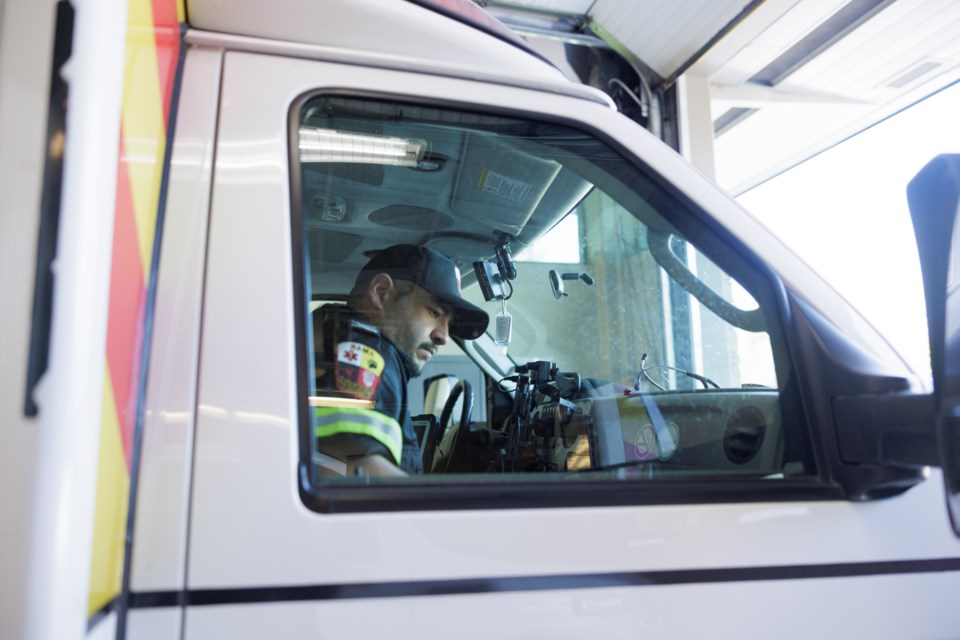W
hen I started this project, I wanted to ride in an ambulance — to sit side-by-side with a few of Ontario’s paramedics and capture the nitty-gritty details of what it’s like to do this job. No. Sorry. Patient confidentiality. Eventually, I was given the green light to visit a small paramedic service in Rama.
The two times I visited Rama Paramedic Services, not much happened. One shift ended and another started. Medical supplies were organized and packed into black zippered pouches. An oxygen tank was replaced by another. Boots were laced up and shirts tucked in.
Coffees in the office. Quiet. Waiting for a call.
Not exactly the action I was hoping for.
But in the lull of activity, something happened. I’d noticed it during my handful of phone conversations with paramedics leading up to this, and it began to happen here.
In the quiet space — with the ever-looming possibility of a 9-1-1 call — these paramedics, fidgeting in computer chairs, leaning against door jams, waiting, opened up.
Their stories revealed an abiding sense of meaning paramedics often feel in their work. But there were also emergency calls that left deep emotional scars — in many cases causing them to question their career choice altogether. They talked about missing important milestones in their children’s lives, of strained and broken marriages, and of coming to terms with their own limitations.
It seems, despite countless hours of training, building competence, and following a dizzying host of protocols and procedures, virtually every paramedic, if they stick with it long enough, will be brought face-to-face with horror, and it will become harder to leave work at work.
Deeply human problem
A study completed back in 2012, found paramedics are more than twice as likely than the general North American population to suffer from post-traumatic stress disorder (PTSD). The rates are higher among paramedics than firefighters and police.
In Ontario, we rely on more than 11,000 paramedics, and more are needed to meet the demands of our growing population. Critical trauma, staff shortages, long hours, shift work, abusive patients, and unsupportive management often culminate to create a tumultuous work environment for paramedics, with 22 percent — one in five — predicted to suffer PTSD during their career.
It’s a complicated journey and a deeply human problem. While a new multi-million dollar PTSD treatment facility is being built in Peel region to help those suffering from PTSD, paramedics ask for more staff, more ambulances, and more empathy from managers — and from the people they serve.
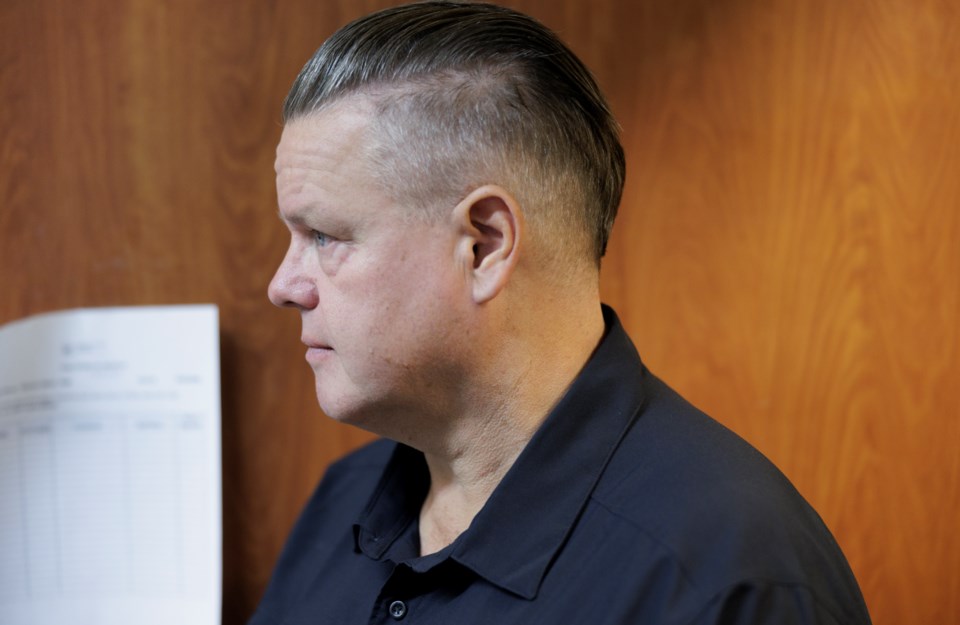
In 1997, Harri Hamalainen volunteered at a summer bible camp where he attended a first-aid and CPR training course for the first time. He learned new skills, like how to splint a simple fracture, and how to deal with major bleeding.
At age 31, the training ignited something inside him — it was thrilling.
His wife, Mina, who had taken the course with him, was less enthused.
“She hated it,” he said. “She thought it was the worst thing ever.”
During their training, the couple — parents, with two young children at the time — learned how to perform CPR on a baby who was VSA (vital signs absent), and the experience was difficult for Mina.
“Having to do CPR on a baby, it was very emotional,” Hamalainen said. “Like, to her, it became almost too real.”
But she knew her husband had discovered something special, and she encouraged him to explore it.
“Mina basically turned to me and said ‘You’re twisted in some way, but maybe you should look into that.'”
Nearly a decade earlier, Hamalainen had been accepted into nursing school, but his wife’s unexpected pregnancy caused him to hit the pause button on school.
At 32 years old, with two young kids at home, he returned to school — this time for paramedicine.
“We sold the house so I could go to school. That’s the commitment level I had from Mina. I figured I'd get school loans or whatever. She's like, ‘No, we'll just sell the house.’ And we lived off that money for the first year of school.”
Shortly after graduating, Hamalainen responded to a 9-1-1 call to a church parking lot.
“I was probably less than six months into my career and I thought my career was done,” Hamalainen said, slowing his speech as he continued. “Because, um, the call was for a young child who was run over in a church parking lot and, um, the child died in my hands.”
Hamalainen said everyone’s training kicked in, and everyone did what they were supposed to, but it wasn’t enough.
“As I was walking away from the hospital bed, one of the nurses looked at me and said, ‘Are you OK?’ And I'm like, ‘Oh, yeah, I'm — I'm fine. Everything's fine.’"
He stepped out into the garage and walked back to the ambulance. “When I went into the back of the ambulance to help clean up the blood, I just started bawling. Like, not a little cry, I mean all-out bawling.”
He found a chair in the hospital garage, sat down, and cried uncontrollably for nearly half an hour.
“All the emotion came out in one rapid swoop and that was it. Once the worst of it subsided, then we did clean the ambulance and we went back to base. I would've been useless to anybody else. I was thankful that we didn't do another call after that.”
Hamalainin’s experience clung to him. He eventually transferred to Muskoka Paramedic Services before settling at Rama Paramedic Services in 2006.
Although never diagnosed with PTSD, until a few years ago, he could still hear the mother screaming over her child.
“It just stuck with me. Like, it was just a sound you never, ever want to hear.”
Someone suffering from PTSD may have flashbacks, disturbing memories of their traumatic experience, and nightmares; they may avoid places or people and conversations that remind them of the trauma.
Intrusive thoughts and moods, such as guilt, anger, self-blame, and shame may infect their inner world. All of this often compounds, leading to physical health problems such as lack of sleep, trouble concentrating, a sense of being on edge and even reckless and self-destructive behaviour.
One paramedic told me that in his early experience with PTSD, he would fly into a rage over a mixed-up coffee order at Tim Hortons; emotional regulation can become extremely difficult.
Invisible injury
“The only reason I got through any of it is Mina,” Hamalainen said. “She is my sounding board. Not every medic is lucky to have somebody that they can basically download on. And somehow Mina can listen to it and it doesn’t affect her at all.
"But that’s the big thing — you need to be able to tell somebody and just to talk it through. The more often I tell the story, the less it hurts.”
According to an Ontario study completed in 2011, when experiencing workplace stress, paramedics mostly turned to family, close friends, and their partners for emotional support.
A scant 17.2 per cent of paramedics indicated they would turn to a supervisor.
“Talk to a friend” isn’t a strong organizational solution to the problem of traumatic experiences at work — but the data is helpful. Some service stations in Ontario have put together volunteer-based peer support groups made up mostly of working paramedics; they provide a listening ear and moral support under the guidance of a trained mental health professional. Hamalainen is now a supervisor at Rama Service Station and does what he can to develop relationships with the paramedics he supports. He wants them to feel comfortable talking to him so he can recognize and respond appropriately when someone is struggling.
“It's easier to see if somebody's hobbling around or their back is injured,” he said. “But it's quite another thing to get that insight into where they are emotionally and psychologically.”
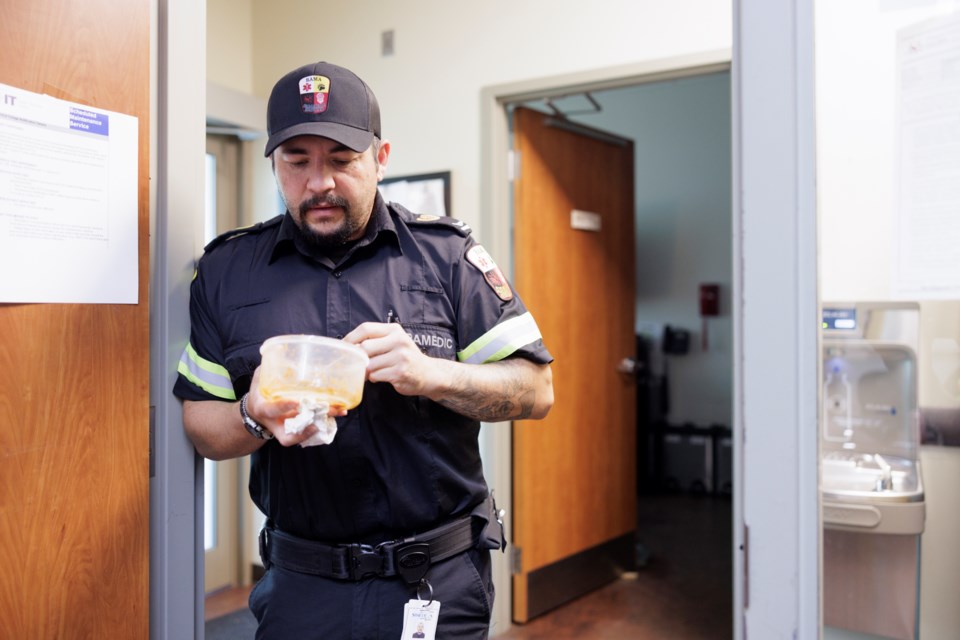
N
ot all critical incidents will traumatize a paramedic, and not all paramedics respond to trauma the same way. This can make it difficult for supervisors like Hamalainen to know how to help.
“When I have a full-timer, or even a part-timer, that comes to me and says, you know, ‘I need time off.’ I'm doing anything I can to give them that time off because I don't need, or want, any of my staff to be working when they're not emotionally ready to work.”
Adam Copegog is a paramedic who works under Hamalainen’s supervision.
“He’s a gem. He's an exceptional leader. He's reasonable. He's goodhearted. He's, I guess, the new type of paramedic leader that this profession needs and being pretty open and supportive and, you know, not there to bang his chest and, you know, this is my way or the highway," said Copegog. "It's more or less...‘I'm here to support you guys and how do I do that from this level?’”
Not all supervisors or upper management in Ontario seem to share Hamalainen’s empathy. And it turns out, a lack of support from management often exacerbates an already tough work environment.
'I love my job. My job is not the problem'
Nearly every paramedic I spoke with asked if they would get the chance to review the story before it was published. There seemed to be a substantial concern that sharing anything negative about their employer — or previous employer — could come back to haunt them.
In one case, a union rep advised a paramedic to remain entirely anonymous — not using their name or the name of the service station they’re employed at. Another paramedic worried about a particular supervisor who might make her life miserable.
Mandy (alias), who asked to remain anonymous, works for two service stations in Ontario. She called one service station “excessively supportive,” and the other she compared to her emotionally abusive ex-husband.
When a violent patient punched her in the face, and kicked her female partner in the chest, they continued providing emergency care before transferring the patient to the hospital. A police officer on the scene asked Mandy if she wanted to submit a report about the assault; she wasn’t sure, so she turned to her supervisor.
“When I called my supervisor for guidance, they said, ‘You wanna do a police report? You wanna press charges? No one does that.’”
She was also told not to bother HR with her questions.
“I remember my ex-husband telling me, ‘Why do you talk to your friends about our problems? Don't do that. You should only be talking to me.’ So, when we got those emails from our deputy chief saying you are not allowed to contact HR if you have questions, I was like, ‘Oh, I've been here before.’”
Ignoring her supervisor's advice, she decided to press charges.
The patient served jail time.
“I love my job. My job is not the problem,” she said. “We do all of these calls. I miss all of my meal breaks. I haven't eaten in 13 hours ... I've peed twice. And management will be like, ‘Why didn't you vacuum the rugs in the base?' Like, ‘You took your boots off while you sat on the couch for 10 minutes. Here, you're getting a writeup for that.’"
She once removed a knife from a patient’s chest in order to perform CPR. Despite her attempts, the patient died. “The only thing I got,” she said, “was, ‘Why did you take the knife out?’”
“They're questioning your judgment, you know, it's almost like you're teenaged girls and they're gossiping about you and they wanna know why you took the knife out so they can tell everyone else what an idiot you are. That's how it feels. Whereas any of the working medics were like, ‘I heard you did that. Are you OK?’”
Mandy isn’t the only paramedic I interviewed from this service. A young man, whom I’ll refer to as Caleb, shared similar insights.
“There is a high number of paramedics and people that we work with that are off on stress leave,” Caleb said. “Not just because of the calls that come along with being a paramedic and what our job entails, but the added stress and systemic issues that we have inside our workplace.”
One morning, Caleb and his partner responded to a call involving a man in his twenties who’d died by suicide. They went through their training and a list of criteria and determined it was futile to attempt to resuscitate the young man. It was a difficult situation for the two young paramedics, but they finished their responsibilities, climbed back into the ambulance and continued the shift.
Caleb and his partner were called into the station later that day for what they assumed would be a debrief. Instead, his partner was told he was suspended for something that happened three weeks prior. But he wasn’t suspended immediately.
“Right now at least — when people are getting suspended — which, this is crazy that I even have to speak about this because people shouldn't be getting suspended — they basically just say, ‘You're suspended, but not today. Like, not the shift that you're currently working; not tomorrow; not the next day. You're suspended at a date of our choosing when we have adequate staffing.’”
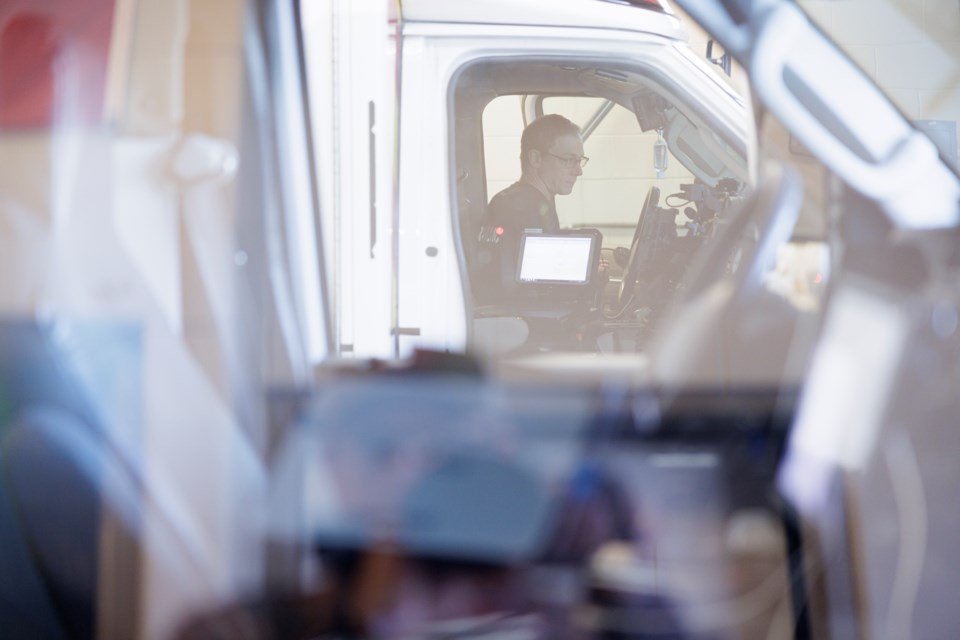
After an hour-long meeting, Caleb and his partner were back on the road responding to calls.
"I watch all of my coworkers deal with all of that,” Mandy said, “and that alone is enough where, if you have something like a critical incident, that's enough to send you absolutely off the deep end in my mind.
“The peer support team has offered to send management to mental health training,” she said, “which they have come back and said, this is bullshit. We don't need this.”
Sanctuary trauma
“Have you heard of ‘sanctuary trauma?’” asks Dr. Jonathan Douglas, a psychologist at Central Ontario Psychology in Barrie who treats first-responders suffering from PTSD.
“What happens in sanctuary trauma, is you're counting on people to have your back once you're injured. So you're counting on your employer to take it seriously. You're counting on worker’s compensation systems to, you know, accept the claim and provide the necessary treatment and care and financing. You're counting on your peers to be supportive.
Sanctuary trauma occurs when, instead of these systems being there for you, what they do is abuse you, in your experience. And that makes it much, much harder to get back into the workplace. It makes it harder to overcome the injury. It sets up an anger — a bitterness that literally impedes the process of healing.”
PTSD ranked the top risk
Mandy was likely paraphrasing when she said management called mental health training “bullshit,” but a recent industry-wide study of Ontario’s paramedic sector revealed a striking disparity between employers and workers when it comes to perceptions of PTSD in the workplace.
In March 2022, the Public Services Health & Safety Association, which is funded by the province’s labour ministry to work with public sector employers and employees, published the results of its Paramedic Sector Risk Assessment and Root Cause Analysis Project.
Participants from paramedic services across Ontario, as well as other industry experts, contributed to the study and identified 105 total hazards, which were consolidated and categorized into 26 main hazard categories. Hazards included equipment reliability, driver fatigue, ambulance design, and violence and abuse.
Paramedics from across Ontario, some working on the ground, some working in the air and from both urban and rural areas, ranked the top hazard: PTSD.
In stark contrast, employers ranked PTSD sixth, below CB radios and ambulance design. The irony is that some hazards not only endanger paramedics physically, they also increase the chances of PTSD.
Shift work; fatigue; violent patients; and equipment issues — hazards, in their many shapes and sizes, seem to push PTSD to the top of the list.
What can be done to reduce the chances of a paramedic suffering PTSD in the face of these risks, and what are paramedic services doing about it?
Reducing the risk
Douglas shared two ways to reduce the risks of PTSD in first-responders.
“Number one, you provide training in psychological readiness,” he said. “You provide training in how to handle stressors. You acknowledge them. You teach people healthy coping strategies. For many, many years the culture has been one of sucking it up.
"We need to acknowledge the value of our human reactions; to be able to speak about them and gain support from our peers is a very important part of this kind of problem," said Douglas.
“The other component is using the workers compensation system as appropriate for treatment, and, if necessary, time away from the job earlier in the career, rather than later,” he said.
Teaching these strategies to paramedics should, in theory, lead to a more resilient workforce.
“But that’s like teaching young drivers in the classroom, right? ‘Here’s the manual, read through it,’” Douglas laughed. “‘You know, if your car goes into a spin remember these rules of how to manage the spin.’ Which is very different from taking the car out in the real world and hitting that patch of ice. And you need to practice it in the real world.
“Psychotherapy, in essence, is training. I'm gonna train you how to handle your emotions. I'm going to train you with the coping strategies and teach you how to apply them in your unique circumstance. When that goes well, with a well-motivated worker who wants to get back onto the job, as most of them do, going back into a workplace which is going to be supportive, as many of them are, then that person's going back into the workplace with an enhanced level of resilience and an ability to handle what's going to come next on the job.”
About a year ago, Jason Hoover, a Simcoe County paramedic for eight years, pulled out of an interview with a reporter because of the climate at work. He was worried about repercussions of saying the wrong thing. New management has created an entirely different atmosphere where he now feels supported and he agreed to speak openly with me.
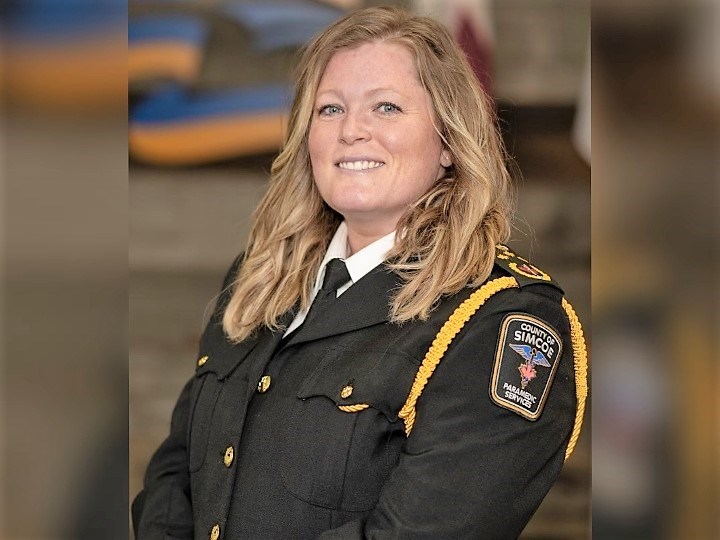
“The management regime now is all brand new at work, so I'm not as scared to lose my job and get raked over the coals for saying anything.”
Copegog, who also works part-time for Simcoe County Paramedics, shares the same attitude — new management has started improving the work environment.
Sarah Mills, director and chief of County of Simcoe Paramedic Services since October 2022, seems to be an important figure in this shift.
“One thing I tell my staff is my goal and my job is to get you home healthy and happy at the end of the day. I will always do my best to do that for you," said Mills.
Maybe it’s her years of experience in the field — she’s worked as a primary care paramedic, an advanced care paramedic, and in tactical — she’s aware of the risks involved with a career in paramedicine, and her concern for the wellness of the paramedics under her care is evident.
“They shouldn’t go home broken at the end of the day. They’re moms and dads and brothers and sisters and that’s my responsibility, and our responsibility as an employer, to do our best to keep them whole.”
Mills isn’t just gushing sentiment either; Simcoe County Paramedic Services has practical solutions readily available to their staff, including Road to Mental Readiness and Resilience Training, which is provided to new paramedics before they go out on the road, timely access to professional psychological support, confidential peer support groups, quiet rooms, and even therapy dogs.
“As we build these programs, and the stigma about needing it decreases, they’re taking more advantage of it," said Mills.
These programs not only serve paramedics, they’re practical from an employer standpoint.
“If we don’t take care of our staff on the front end, we’re going to lose them anyways; they’re going to end up suffering from an occupational stress injury," said Mills.
"We’re not going to be able to entirely eliminate the risks that paramedics face, like stressors, you know, instances of violence, safety on scene –– we won’t be able to eliminate all of it, but we can work really hard to decrease them.”
It makes one wonder why a paramedic would stay in a service that doesn’t seem committed to their wellness when there seem to be many opportunities elsewhere.
Why not leave and go work for a more supportive service?
Sense of duty
“I stay in the abusive service,” said Mandy, “because I have a sense of duty to my fellow coworkers. Because I am hoping against hope by being like” — she stopped — “Ooh, sorry, I didn't think I was gonna cry.
"By being a good example and trying my hardest and keeping emotional space for people when they need it. This service needs people who recognize this is wrong and who try to do something about it.
"It's like, my duty is to stay with these people who I have committed to, and by ‘these people’, I mean my co-workers and the community; because the community is at a huge disservice when we are this beaten down.”
Cole T. Bennett is a freelance writer as well as a commercial filmmaker and photographer. He lives with his wife and three kids outside of Washago, Ont. He can be reached at [email protected].
